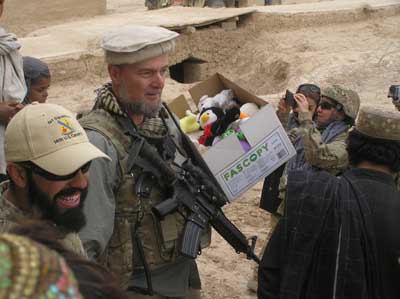
Charles with some of the stuffed animals he distributed in March to the children of Fateh Shelah, a village in Afghanistan. His 11-year-old daughter, Ayden, collected three boxes of stuffed animals from her friends as a sign of good will between the children of the U.S. and Afghanistan.
June 14, 2013
Forestry professor believes in lending a helping hand
The members of our faculty make a positive difference for friends and neighbors in practically any community – whether it is within a few miles of the SIU campus, or 7,500 miles away.
That’s how far from campus and his family forestry Professor Charles Ruffner was for the past year, serving as an agricultural ambassador in Zabul Province, Afghanistan. Charles is well familiar with the country; this was his fifth visit.
The commitment of our College of Agricultural Sciences to helping farmers in the war-torn nation dates to 2005. For example, each month during the past two years, Charles and other members of the faculty have conducted week-long agricultural training sessions at Fresno State University for soldiers preparing to deploy to Afghanistan.
A native of York, Pa., an Army veteran and a three-degree graduate of Penn State, Charles joined our faculty in 1999. He and his students are well known throughout our region for providing forest management assistance to landowners. In addition to teaching undergraduate and graduate courses, Charles is the advisor to the Fire Dawgs, which helps students gain experience in prescribed burning and other forest management techniques.
Afghanistan, Charles says, “is an amazing country.” When a military commander he knows suggested a year-long deployment as a civilian, Charles jumped at the opportunity. He served as an agro-forestry and hydrology expert with an agri-business development team that included a Mississippi National Guard unit.
They conducted “high-value crop surveys,” focusing on 30 villages. Together with interpreters, the team visited two villages each day, talking with the farmers. Wearing a beard and civilian clothes, Charles was able to establish a bond with the Afghans.
“We’d go under the shade tree, bring out the almonds, apricots, and tea, and talk,” he said. “We used those meetings to introduce ourselves and to ground ourselves into the issues in each village. We then would debrief about what we saw, such as crop pest problems, water problems, soil problems.”
They shared their assessments, and solutions, with the villagers. Charles wanted to help because “there is something very infectious about working in that country, thinking that one of our main missions in life is to help people in need.”
That is a lesson he shares with his students.
“I tell them that they can do this kind of work, where they are serving their country and using their expertise to help a nation out,” he said. “I wanted to go into villages and be a helpful face, someone who when they see me, they know I’m there to talk agriculture.”
During his last several visits to many of the villages, the elders noted that the U.S. team did not provide them with any new facilities.
“I told them that years ago, we were spending money building bridges and dams and roads,” Charles said. “When we came in this time, our commander said we have wheelbarrows, shovels, picks and our expertise, and we are going to help train them to be better farmers. We weren’t building better farms. We were training better farmers.”
Whether it is in our backyard or halfway around the world, I appreciate the willingness of our dedicated faculty to lend a helping hand.
